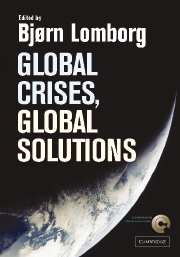Epilogue: Youth Forum Human Benefit Analysis
Published online by Cambridge University Press: 22 September 2009
Summary
Background: The Copenhagen Consensus Youth Forum
If you thought that young university students belong to a fast-food, zapper culture and think only about the night tonight and the day tomorrow, then the Copenhagen Consensus Youth Forum would have made you think again. Eighty young graduate students from twenty-five countries met in Copenhagen to repeat the same exercise as the eight senior economists: to prioritise the challenges and opportunities of the world.
Over five intensive days in Copenhagen, the young people debated the global challenges in parallel to the deliberations of the experts in the Copenhagen Consensus. Each day, they heard the authors of the chapters and Perspective papers present their views, and they had plenty of time to ask questions and propose their own opportunities to meet the challenges. After listening to and discussing the issues raised, a group of eight participants made a presentation championing each challenge, followed by a second group arguing against a high priority for it. At the end of the day, votes were cast on the challenges and opportunities put forward – including any additional opportunities identified by the Youth Forum. In this way, a rolling list of priorities was established, not completed until the voting on the last challenge had taken place on the final day (see the table on p. 646).
- Type
- Chapter
- Information
- Global Crises, Global Solutions , pp. 645 - 648Publisher: Cambridge University PressPrint publication year: 2004



